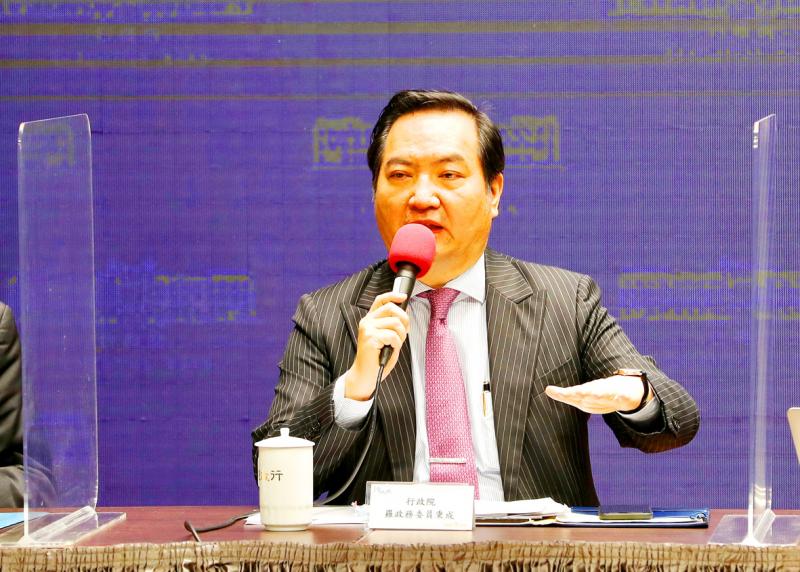The Executive Yuan yesterday approved a package of amendments to the Civil Code that would lower the age of majority from 20 to 18, which, if passed by the Legislative Yuan, is expected to take effect in 2023.
The package includes 38 legal amendments involving 14 central government agencies, Minister Without Portfolio Lo Ping-cheng (羅秉成) told a news conference at the Executive Yuan in Taipei.
The proposals were made to bring the nation in line with the international trend, as the age of majority in the US, the UK, France and Germany are all 18, Lo said, adding that Japan in 2018 also passed legislation that lowered the legal age to 18.

Photo: CNA
The age of criminal responsibility is 18, but the legal age defined by the code is 20, which has resulted in incongruities, he said.
Furthermore, the legal age of marriage for men is 18, but 16 for women, which runs counter to the values of gender equality, he said.
International experts have said that the nation’s marriageable age for women contravenes the UN Convention on the Rights of the Child and The Convention on the Elimination of all Forms of Discrimination Against Women, and that allowing women to marry at the age of 16 is tantamount to condoning child marriage, he said.
The legal age in the code was defined in 1929, which no longer fits today’s needs, considering how much more mature young people are today than in the past, he said.
If passed, Taiwanese who have turned 18 would be able to do a list of things that they would otherwise have had to wait, including renting a house, signing a contract, opening a bank account, starting a company or serving as a company director, filing a lawsuit or becoming members of commercial or education groups, he said.
The lowering of the legal age would have a profound impact on the nation and usher in a new era, he said, adding that it is imperative that all agencies affected adjust their administrative work accordingly.
Society today is far more advanced from 91 years ago in that people are more educated and enlightened, which merits the lowering of the legal age, Premier Su Tseng-chang (蘇貞昌) said.
There are 110 nations in the world that set their age of majority at 18, he said.
Academics, civic groups and students have long called for the age to be lowered, and the changes have been proposed in response to public expectations, he said.
Government agencies should communicate extensively with legislative caucuses so that the proposals could swiftly be passed into law, he said.
National Alliance of Parents Organizations chairman Hsieh Kuo-ching (謝國清) said he welcomed the amendments, but added that the government should improve education on students’ problem solving skills and help them learn to be responsible for their decisions.
Additional reporting by Rachel Lin

MAKING WAVES: China’s maritime militia could become a nontraditional threat in war, clogging up shipping lanes to prevent US or Japanese intervention, a report said About 1,900 Chinese ships flying flags of convenience and fishing vessels that participated in China’s military exercises around Taiwan last month and in January have been listed for monitoring, Coast Guard Administration (CGA) Deputy Director-General Hsieh Ching-chin (謝慶欽) said yesterday. Following amendments to the Commercial Port Act (商港法) and the Law of Ships (船舶法) last month, the CGA can designate possible berthing areas or deny ports of call for vessels suspected of loitering around areas where undersea cables can be accessed, Oceans Affairs Council Minister Kuan Bi-ling (管碧玲) said. The list of suspected ships, originally 300, had risen to about 1,900 as

Japan’s strategic alliance with the US would collapse if Tokyo were to turn away from a conflict in Taiwan, Japanese Prime Minister Sanae Takaichi said yesterday, but distanced herself from previous comments that suggested a possible military response in such an event. Takaichi expressed her latest views on a nationally broadcast TV program late on Monday, where an opposition party leader criticized her for igniting tensions with China with the earlier remarks. Ties between Japan and China have sunk to the worst level in years after Takaichi said in November that a hypothetical Chinese attack on Taiwan could bring about a Japanese

MORE RESPONSIBILITY: Draftees would be expected to fight alongside professional soldiers, likely requiring the transformation of some training brigades into combat units The armed forces are to start incorporating new conscripts into combined arms brigades this year to enhance combat readiness, the Executive Yuan’s latest policy report said. The new policy would affect Taiwanese men entering the military for their compulsory service, which was extended to one year under reforms by then-president Tsai Ing-wen (蔡英文) in 2022. The conscripts would be trained to operate machine guns, uncrewed aerial vehicles, anti-tank guided missile launchers and Stinger air defense systems, the report said, adding that the basic training would be lengthened to eight weeks. After basic training, conscripts would be sorted into infantry battalions that would take

DEEP-STRIKE CAPABILITY: The scenario simulated a PLA drill that turned into an assault on Taiwan’s critical infrastructure, with the launchers providing fire support Taiwan yesterday conducted this year’s first military exercises at Longsiang Base in Taichung, demonstrating the newly acquired High Mobility Artillery Rocket System’s (HIMARS) ability to provide fire support and deep-strike capabilities. The scenario simulated an attack on Penghu County, with HIMARS trucks immediately rolling into designated launch areas and firing barrages at the Wangan (望安) and Cimei (七美) islands, simulating the provision of fire support against invading forces. The HIMARS are supposed to “fire and leave,” which would significantly increase personnel and equipment survivability, a military official said. The drill simulated an exercise launched by the Chinese People’s Liberation Army (PLA) Eastern